
COGNITIVE NEUROPSYCHOLOGY
Scope & Guideline
Exploring the Intersection of Cognition and Neural Science
Introduction
Aims and Scopes
- Cognitive Mechanisms in Neuropsychology:
The journal explores cognitive mechanisms affected by neuropsychological disorders, investigating how impairments in processes such as language, memory, and perception manifest in various populations. - Interdisciplinary Approaches:
COGNITIVE NEUROPSYCHOLOGY employs interdisciplinary methodologies, integrating insights from psychology, neuroscience, linguistics, and computational modeling to provide a comprehensive understanding of cognitive deficits. - Developmental and Acquired Disorders:
Research focuses on both developmental disorders (e.g., dyslexia, prosopagnosia) and acquired conditions (e.g., aphasia, Alzheimer's disease), highlighting the unique cognitive profiles associated with each. - Empirical and Theoretical Contributions:
The journal publishes empirical studies as well as theoretical discussions that contribute to the understanding of cognitive processes and their neural underpinnings, fostering a dialogue between research and clinical practice. - Language and Communication:
A significant emphasis is placed on language production and comprehension, examining the cognitive and neural bases of linguistic abilities and their impairments.
Trending and Emerging
- Interdisciplinary Language Studies:
Recent publications emphasize the intersection of linguistics and cognitive psychology, showcasing complex interactions between semantics, phonology, and language processing across different languages and populations. - Cognitive Profiles in Developmental Disorders:
There is a growing focus on characterizing cognitive profiles associated with specific developmental disorders, such as prosopagnosia and dyslexia, which aids in understanding the individual variability within these conditions. - Neurological Underpinnings of Cognitive Functions:
Emerging themes are increasingly addressing the neurological bases of cognitive functions, with studies investigating the brain mechanisms underlying speech production, memory retrieval, and social cognition. - Real-World Applications of Cognitive Research:
Trends indicate a shift towards applying cognitive neuropsychological research to real-world settings, including educational interventions for dyslexia and therapeutic approaches for aphasia, emphasizing the practical implications of research findings. - Innovative Methodologies:
The adoption of innovative methodologies, such as eye-tracking and advanced computational models, is on the rise, reflecting a trend towards more sophisticated analyses of cognitive processes and their impairments.
Declining or Waning
- Visual Processing Models:
While visual processing remains an important topic, the focus on specific computational models of visual perception has decreased, possibly due to a growing interest in more integrative approaches that encompass broader cognitive functions. - General Theories of Dyslexia:
The exploration of general theories surrounding dyslexia appears to be less frequent, suggesting a move towards more nuanced studies that consider the heterogeneity and specific profiles of dyslexic individuals rather than overarching models. - Traditional Neuroimaging Techniques:
The reliance on traditional neuroimaging methods, such as fMRI, is waning, as researchers increasingly adopt innovative methodologies, including machine learning and real-time neuroimaging, to gain deeper insights into cognitive processes.
Similar Journals
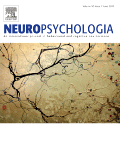
Neuropsychologia
Charting New Territories in Experimental Psychology and NeuroscienceNeuropsychologia, published by PERGAMON-ELSEVIER SCIENCE LTD, is a premier journal that delves into the intersections of psychology and neuroscience, specifically focusing on behavioral and cognitive processes. Since its inception in 1963, this esteemed journal has been a vital platform for researchers, professionals, and students, showcasing innovative studies and advancements in the fields of Behavioral Neuroscience, Cognitive Neuroscience, and Experimental Psychology. With a commendable impact factor, placing it in the Q2 category across multiple disciplines, Neuropsychologia is recognized for its contribution to the scientific community, ranking among the top journals in both Experimental and Cognitive Psychology and Neuroscience. The journal's commitment to excellence is evident in its rigorous peer-review process and its mission to disseminate cutting-edge research, making it an invaluable resource for those seeking to expand their knowledge and insights in neuropsychology. For further reading, the journal is accessible in both print and digital formats, ensuring that researchers can easily engage with the latest findings and theoretical advancements in this dynamic field.
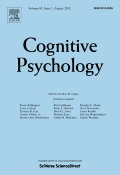
COGNITIVE PSYCHOLOGY
Unraveling the Mysteries of the MindCOGNITIVE PSYCHOLOGY is a premier academic journal published by Academic Press Inc. Elsevier Science, specializing in the dynamic and evolving field of cognitive psychology. With a significant history spanning from 1970 to 2024, this journal has established itself as a critical resource for researchers and professionals alike, boasting a distinguished ranking in the Q1 category across multiple disciplines, including Experimental and Cognitive Psychology, Neuropsychology, and Artificial Intelligence. Its impact factor, reflective of its influence and reputation within the academic community, positions COGNITIVE PSYCHOLOGY as an essential platform for disseminating cutting-edge research and theoretical advancements. Although it is not open access, subscribers gain exclusive insights into the latest findings that drive the field forward. The journal's commitment to fostering innovative research makes it an indispensable tool for those dedicated to understanding the complexities of human cognition.
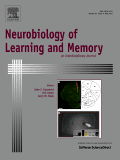
NEUROBIOLOGY OF LEARNING AND MEMORY
Pioneering Research on Memory and Learning DynamicsNeurobiology of Learning and Memory is a prestigious journal dedicated to the exploration of the neural mechanisms underlying learning and memory processes. Published by Academic Press Inc Elsevier Science, this journal boasts a strong reputation within the field, as evidenced by its impressive impact factor and high quartile rankings in multiple categories, including Q1 in Behavioral Neuroscience and Q2 in Cognitive Neuroscience. Having provided a platform for groundbreaking research since its inception in 1995, the journal aims to disseminate influential findings that further our understanding of cognitive processes, shaped by robust empirical studies and theoretical developments. Researchers and professionals in neuroscience, psychology, and related disciplines will find invaluable insights and advancements that underscore the journal's commitment to fostering knowledge and innovation within these fields. While it currently operates under a subscription model, its comprehensive coverage of crucial topics positions it as a vital resource for those engaged in the intricate study of learning and memory.

Neuropsychological Trends
Pioneering Insights into Cognitive and Psychological ConditionsNeuropsychological Trends is a prominent, open-access journal published by LED EDIZIONI UNIV, based in Italy. Since its inception in 2007, the journal has dedicated itself to advancing research in the fields of neuropsychology and cellular neuroscience, catering specifically to the evolving trends shaping these disciplines. With the ISSN 1970-321X and an E-ISSN of 1970-3201, the journal provides a platform for multidisciplinary dialogue and exploration of neuropsychological phenomena. While ranked in the fourth quartile for both Cellular and Molecular Neuroscience and Neuropsychology and Physiological Psychology categories in 2023, the journal encourages innovative research that aims to enhance understanding and treatment of cognitive and psychological conditions. The convergence of years from 2011 to 2024 marks a significant period for contributions that inform clinical practice and theoretical frameworks. As researchers, professionals, and students engage with cutting-edge studies and reviews, Neuropsychological Trends serves as a vital resource for staying informed and fostering collaboration in the neuropsychological community.
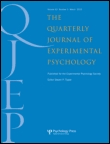
QUARTERLY JOURNAL OF EXPERIMENTAL PSYCHOLOGY
Empowering Research in Cognitive and NeuropsychologyQuarterly Journal of Experimental Psychology, published by SAGE Publications Ltd, is a leading peer-reviewed journal that serves as a vital resource in the fields of experimental and cognitive psychology, neuropsychology, and medicine. With an impactful contribution to psychological research, the journal is recognized for its rigorous methodology and empirical studies, holding a notable ranking among its peers—finding itself in the Q2 quartile across several categories. With its origin tracing back to 2006, Quarterly Journal of Experimental Psychology significantly influences the academic discourse until its latest published findings in 2024. Catering to a diverse audience of researchers, professionals, and students, this journal provides Open Access options, enhancing the reach and accessibility of cutting-edge psychological research. By focusing on innovative approaches and findings, it aims to bridge theoretical understanding with practical application, hence fostering advancement in multiple related disciplines. For those committed to understanding the complexities of human behavior and cognitive processes, this journal remains an essential reference point.
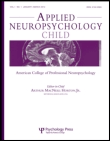
Applied Neuropsychology-Child
Exploring the intricacies of developmental psychology.Applied Neuropsychology-Child is a leading academic journal dedicated to advancing the field of developmental and educational psychology, as well as neuropsychology, with a particular focus on child development. Published by Routledge Journals, Taylor & Francis Ltd, this journal provides critical insights into the cognitive and behavioral aspects of children, fostering interdisciplinary dialogue among researchers, clinicians, and educators. With a commendable impact factor and a categorization of Q3 in both associated fields for 2023, the journal plays a pivotal role in shaping current practices and enhancing academic discourse. Access to Applied Neuropsychology-Child is available through subscription, ensuring that high-quality research is disseminated widely amongst scholars and professionals. Since its inception in 2012, this journal has consistently aimed to illuminate the challenges and developments in child neuropsychology, making it an essential resource for anyone invested in the psychological well-being and educational success of children.

Applied Neuropsychology-Adult
Advancing understanding in adult neuropsychology.Applied Neuropsychology-Adult is a premier journal published by Routledge Journals, Taylor & Francis Ltd, dedicated to advancing the field of neuropsychology with a particular focus on adult populations. Since its inception in 2012, this journal has been a vital platform for disseminating innovative research, reviews, and clinical insights into the cognitive and psychological processes that influence adult behavior and functioning. With an impressive Scopus ranking, including Q3 status in both Developmental and Educational Psychology and Neuropsychology and Physiological Psychology, it demonstrates a commitment to high-quality scholarship that informs both clinical practice and theoretical understanding. Researchers, clinicians, and students alike will benefit from the journal's commitment to open access, providing broad access to valuable knowledge in the domain of neuropsychology. As it converges towards its 2024 milestone, Applied Neuropsychology-Adult continues to be an essential resource for those seeking to deepen their understanding of neuropsychological processes and their application in real-world settings.
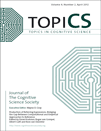
Topics in Cognitive Science
Advancing the Frontiers of Human CognitionTopics in Cognitive Science, published by WILEY, is a premier interdisciplinary journal that advances the understanding of the cognitive processes that underpin human behavior and interaction with technology. With a commendable impact factor and a strong focus on research from 2009 to 2024, this journal garners significant attention in various subfields, as evidenced by its Q1 ranking in Experimental and Cognitive Psychology and Linguistics and Language, alongside a Q2 position in Artificial Intelligence, Cognitive Neuroscience, and Human-Computer Interaction. Researchers and professionals will find invaluable insights into the latest experimental findings, theoretical discussions, and practical applications that bridge cognitive neuroscience, psychology, and computer science. Topics in Cognitive Science is especially pivotal for those aiming to delve deeper into cognitive mechanisms and their implications within our increasingly digital world, making it an essential resource for students and scholars alike.
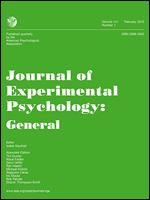
JOURNAL OF EXPERIMENTAL PSYCHOLOGY-GENERAL
Pioneering Empirical Studies in PsychologyJOURNAL OF EXPERIMENTAL PSYCHOLOGY-GENERAL, published by the American Psychological Association, is a leading journal in the field of experimental and cognitive psychology. With an ISSN of 0096-3445 and a robust impact factor that reflects its significant contribution to research, this journal serves as a premier outlet for empirical studies that advance our understanding of psychological processes across development and cognition. Covering a wide array of topics from developmental neuroscience to general psychology, it is categorized in the Q1 quartile across multiple fields, making it a vital resource for researchers, professionals, and students alike. The journal has maintained a consistent publication record since its inception in 1975, continuously freeing insights that shape the future of psychology and related disciplines. With rigorous peer review and high standards of scholarly excellence, JOURNAL OF EXPERIMENTAL PSYCHOLOGY-GENERAL remains an essential platform for disseminating innovative psychological research.
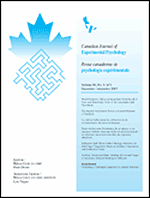
CANADIAN JOURNAL OF EXPERIMENTAL PSYCHOLOGY-REVUE CANADIENNE DE PSYCHOLOGIE EXPERIMENTALE
Elevating Understanding Through Rigorous ResearchCanadian Journal of Experimental Psychology / Revue canadienne de psychologie expérimentale (ISSN 1196-1961, E-ISSN 1878-7290), published by the Canadian Psychological Association, serves as a vital resource in the fields of Experimental and Cognitive Psychology and general psychological research. With a respectable impact factor that places it in the Q3 category for both Experimental Psychology and miscellaneous Medicine (2023), this journal offers a platform for innovative research that furthers our understanding of psychological processes. Spanning years from 1993 to 2024, it connects researchers, professionals, and students to contemporary findings and methodologies, fostering a collaborative environment for the advancement of psychological science. Though it does not currently offer Open Access, the journal's commitment to quality and relevance in psychological research continues to make it an important part of the academic landscape, supporting the dissemination of knowledge within a global community.